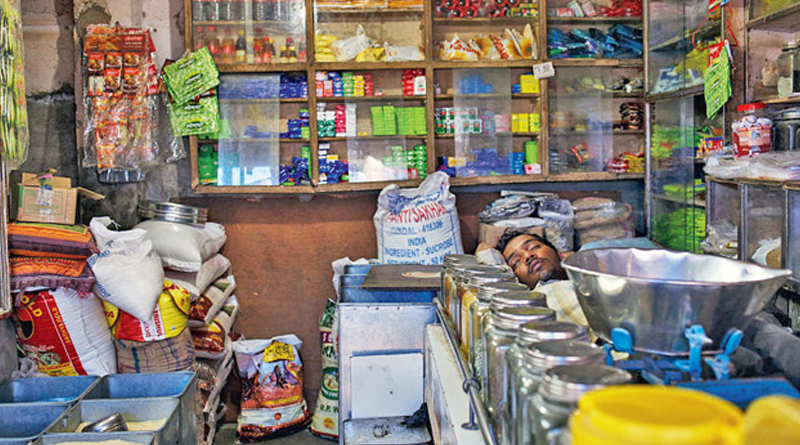A Delhi seminar last week discussed what intellectuals see as the next great idea for social revolution: a Univers al Basic Income (UBI). Prof Pranab Bardhan proposed a UBI of . 10,000 a year as a citizen\’s right, to be ` funded by raising a whopping 10% of GDP by eliminating tax breaks and wasteful subsidies. Prof Vijay Joshi proposed a UBI of ` . 3,500 a year, costing3.5% of GDP . A finance ministry official presented the UBI proposal discussed in Economic Survey 2017.Most speakers viewed UBI as desirable, though many thought it was a task for the future. Others worried about the cost, the diversion of funds from worthier causes, and the granting of this privilege to all including the richest.
Working Hardly
Iwas the one speaker to oppose UBI on moral and practical grounds. `Basic income\’ must be enough to live on. It must provide at least a poverty-line income. All the proposals so far provide only a fraction of the poverty line, yet require draconian fiscal efforts. Joshi\’s UBI of ` . 300 a month is the pocket money of a middle-class schoolboy . Why call such small sums `basic income\’, and hype them as a social revolution that expands the Rights of Man? Iwant a society where people stand on their own feet. The State must pro vide high-quality public goods, including security , basic health and education, infrastructure. It must also have targeted efforts to uplift the poor. But I denounce as immoral a UBI that makes it feasible to avoid working altogether. I want an India taking pride in hard work, not in a large public nipple for sucking.
When my son turns 18, I want him to look forward to working for a living. I don\’t want him to be able to collect a UBI and sit at home playing video games. That will make for a lousy society .
An idle mind is the devil\’s workshop. Without work, people will get into undesirable activities, from petty crime and gambling to terrorism. Muslim ghettoes in Europe have unemployed hordes living off welfare, and produce Islamic radicals. President Bill Clinton in the US converted welfare into workfare, with great social and economic success.
The conversion of some subsidies to cash transfers can be a useful palliative, but not a cure for poverty . The cure lies in improving state capacity and public goods. Poor people with no access to decent education, health and networks are excluded from the development process. Providing human capital and opportunity to the poor is far more important than cash grants.
Economists can cite ways of creating massive fiscal headroom of 10% of GDP , enough to finance both a big expansion of public goods and UBI.But this means creating an efficient, innovative and non-corrupt polity that steers clear of populism. If we had such a polity , GDP growth would accelerate to12-15%, prosperity would boom and UBI would become irrelevant. Alas, we must live with the highly flawed polity we have, where fiscal headroom is a fantasy .
When one state after another got stampeded into announcing farm lo ans waivers, did they first create fis cal headroom? No, the spending sp ree was announced with no fiscal space at all. The money will be found by cutting other programmes and delaying payments.
In every election campaign, parti es compete in announcing ever more freebies, even if fiscal space is zero.
Politically , UBI will have to compete with a hundred new freebies aimed at specific vote banks. Guess who will lose?
Universal Baby Income
Without fiscal headroom, UBI can only be at the expense of other essen tial spending. We must set priorities.
I am clear that improved health, edu cation and infrastructure must take priority over doles.
A large UBI will create incentives for having more babies. Lalu Prasad Yadav is laughed at for having nine children. But if that means getting an additional nine UBIs from the go vernment, Yadav could become the new role model. Hum do, hamare nau.
A UBI will attract millions of im migrants from Bangladesh and Ne pal, mostly illegal. This will create horrendous problems for Assam, which already fears being swamped by Bangladeshis. You can see Assam refusing to implement any UBI.
Proponents of UBI say it will not lead people to reduce work. But the sharp rise in agricultural wages after 2008 led to the massive withdrawal of over 40 million women from the workforce. Clearly, a cash bonanza affects the labour market. US President Clinton\’s workfare reforms raised employment hugely through new rules to encourage work over doles.
UBI proponents think they occupy the high moral ground. Mohandas Gandhi would disagree. He declared, “My ahimsa would not tolerate the idea of giving a free meal to a healthy person who has not worked for it in some honest way . If I had the power, I would stop every Sadavarta where free meals are given. It has degraded the nation and it has encouraged laziness, idleness, hypocrisy and even crime. Such misplaced charity adds nothing to the wealth of the country , whether material or spiritual, and gives a false sense of meritoriousness to the donor.“


